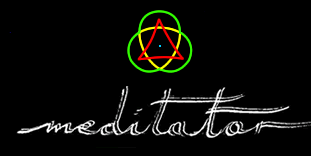FROM MEDITATOR.ORG
'Being Centred'
When I remember times of 'being centred', even for the briefest of moments,
I also recollect having had intense feelings such as:
Great joy in being reunited.
Bitterness for having been 'absent' for a long time.
Great fear and awe.
Surprise at all my body's sensations.
Affection and expansiveness.
A sense of scale. A place from where I can measure.
Temptation to go and tell others about 'it'.
Meditation offers moments of real transcendence.
When we meditate our feelings, dreams or visions, our thoughts and
sensations are often intensified. These are not the meditation itself
but the manifest 'by-products' of ourselves.
They could be compared to the sound of a car's engine running and the
flashing lights of its dashboard. But, just as a car's engine can be
voluntarily switched on or off, to meditate we too can deliberately switch off our own habitual mind, but without falling asleep. After a 'good'meditation session we may notice that we have recharged our
batteries. This is because in meditation we are in our very centre
connecting with energy of a larger order that is outside of our
personal world.
One may ask whether the aim of meditation should be to stop all
thoughts, feelings, sensations and volitions from constantly arising
within us. Doing this can certainly save some energy and make our
meditation deeper, calmer more efficient and very powerful. Such a
task is never ending because these 'by-products' will always be
arising. Cleaning and purifying oneself however, is not the final aim
of meditation but an important energy saving device that facilitates
entry into deeper meditation, and enables the meditator to be nimble
and able to access all levels within oneself.
The 'real aim' of meditation is beyond something that can be
conceived or formulated by words or images. It can be something
intensely personal - yet objectively real - so one can not make a
rule about what the aim of meditation should be for all people. It might take onea whole lifetime to find out what the aim of one's own meditation is!
Itis good to meditate even when one has no aim in mind at all .
One could simply say that the object of meditation is meditation
itself and that its path leads to direct 'knowing'. But even this definition is just my own personal view.
Our own words, images or gestures can be used in this earthly existenceto artfully describe and communicate something important to oneselfand others, just as the captain of a ship might keep a daily travel log to keep track of where his ship has been and where it might go next.
The Persian Sufi poet Jalal-ad-Din Muhammad Rumi who lived
in the thirteenth century was a mystic and a master wordsmith. These
two short poems of his, possibly about a form of moving meditation
performed by the Dervishes of his sect, can still enlighten us
today:
"I stand up, and this one of me
turns into a hundred of me.
They say that I turn around You.
Nonsense. I turn around me."
---------
"Walk to the well.
turn as the earth and moon turn,
circling what they love.
Whatever circles comes from the centre."
---------
Many people are afraid of using their creative side to communicate
with others because they are afraid that their good is not good enough. But such commonplace fears and self-judgments are useless to oneself and damaging because they become obstacles to interacting effectively in this world.
'Play' is a good natural antidote that can remove the paralysis produced by these poisons. Play can be both healing and transformative, it increases concentration, develops skills, and enriches our experiences in enjoyable and meaningful ways because it engages the deep parts in us.
Taking time out to find one's centre and from that place play and experiment with even one single element of one's world, is both healing and transformative.
-Copyright Byron Zeliotis-
| 